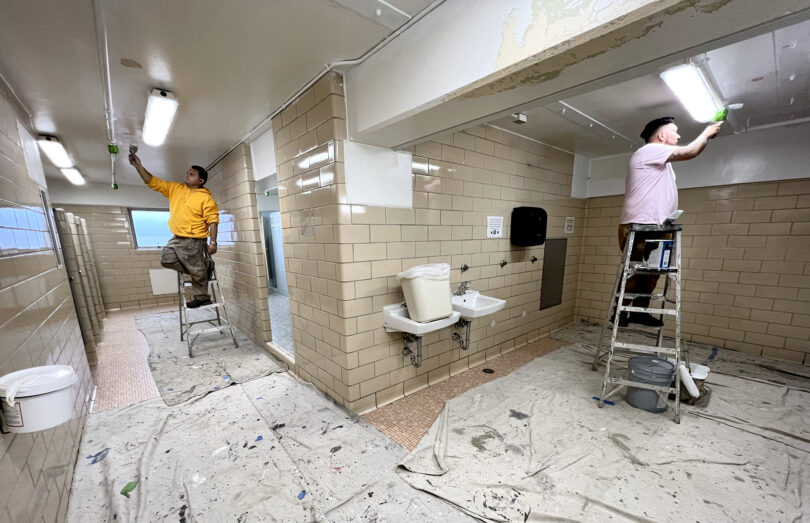As residence halls reopen following the winter break, University of Georgia students are returning to residential spaces that have been deep cleaned and inspected for air quality – the result of an initiative to complete intensive cleaning and maintenance across all 22 residence halls on campus.
“We’re delighted to welcome back UGA students to their on-campus homes,” said Linda Kasper, University Housing executive director. “At the same time, we’re asking students to get more involved in order to help maintain clean and safe living spaces to protect the health and well-being of all of our students in our residential communities.”
The deep-cleaning work, which will continue throughout early January, included:
- Replacing or cleaning air filters.
- Deep cleaning community bathrooms.
- Cleaning targeted carpets.
- Inspecting and replacing select caulk in public bathrooms.
- Deep cleaning community kitchens, study lounges, lobbies and other common spaces.
- Cleaning corridor, common area registers and grills.
- Cleaning lighting fixtures.
- Cleaning window and fan coil units.
- Replacing study lounge window units in Boggs, Church, Mell and Lipscomb.
- Painting community bathroom ceilings with mold-inhibiting topcoat in Church, Boggs, Lipscomb, Hill and Mell.
- Replacing common area furniture in Boggs, Church, Hill, Mell and Lipscomb.
University Housing hired an outside contractor for air quality testing to conduct spore trap testing, as well as to take air temperature and humidity measurements at various testing locations.
A total of 138 tests were taken as a random sample across all 22 residence halls on campus. Only three tests came back with results showing above average spore levels at two residence halls on campus. One test was the result of moisture accumulating in a resident’s personal dehumidifier that had not been emptied, while another was from an in-suite bathroom that had not been properly cleaned by residents. The third test was the result of an apparent roof leak, which has since been repaired by University Housing, with additional testing performed for adjacent rooms. University Housing has remediated the mold found from these tests and will continue to conduct additional tests to update readings. Results from additional air quality testing are expected later this month and will be analyzed to determine if further action is needed.
According to the U.S. Environmental Protection Agency, mold is part of the natural environment and can be found everywhere, including indoors. While the EPA states that there is no practical way to eliminate all mold and mold spores in an indoor environment, moisture control is key.
“Student residents play an important role in Housing’s efforts to address mold issues,” Kasper said. “They are encouraged to take proactive measures to prevent mold from growing in their rooms and to report any areas of concern immediately to University Housing. We need residents to partner with us and help prevent these issues from occurring as much as possible.”
Students who live in UGA’s residence halls are provided with additional guidance on these measures through University Housing’s Student Well-Being page. Some of the steps students living in on-campus residences are encouraged to take include:
- Avoid tossing backpacks or clothes worn outside on beds to prevent spreading allergens to the sleeping area.
- Hang damp or wet towels, bathmats, clothing or other items immediately on racks and allow items to dry completely. Do not hang damp or wet items over the furniture in the room or closet doors.
- Keep windows and exterior doors closed when the air conditioner or heater is running to prevent condensation on vents.
- Set thermostats no lower than 70 degrees when cooling and no higher than 74 degrees when heating your room; fans should be set on low speed.
- Clean and dry any visible moisture on windows, walls and other surfaces immediately; never allow water to sit on soft surfaces (carpets, towels, sheets, etc.) for long periods of time.
- Immediately report all maintenance and/or custodial issues by submitting a work request.
University Housing will also begin more periodic inspections for mold during routine health and safety inspections of residences on campus, as well as continuing air quality and other testing measures as needed.
In addition to the recent deep-cleaning initiative, university officials are nearing finalization of a plan, under development since late summer, to direct $20 million to renovate five first-year residence halls by 2025. The five four-story buildings on the list — Boggs, Church, Hill, Mell and Lipscomb — were initially constructed in 1961 and currently house approximately 160 students each in double-occupancy rooms with community bathrooms.
Since 2013, the university has invested nearly $170 million in renovations of major building systems including plumbing, electrical, mechanical, fire, security, and heating and air. To meet the challenges presented by community living in UGA’s geographic location and outdoor environment, proactive attention has been given to air quality, including annual testing conducted by outside vendors, upgrading HVAC and air systems to the most up-to-date components, installing UV dehumidification systems, and completely renovating bathrooms and water systems.
University Housing allocates approximately $6 million annually, in addition to major renovations, to conduct various improvements to life safety, security and other mission-critical components beyond normal maintenance projects. Examples include fire alarm upgrades, building roof replacements, student furniture renewals, and carpet and other flooring replacements. University Housing also has a preventative maintenance plan in place to ensure various building systems are running optimally. This is in addition to daily building services sanitation and maintenance efforts to keep common areas like bathrooms, hallways, lounges, stairwells, laundry rooms, kitchens, and public lobbies and restrooms clean and comfortable for the students





